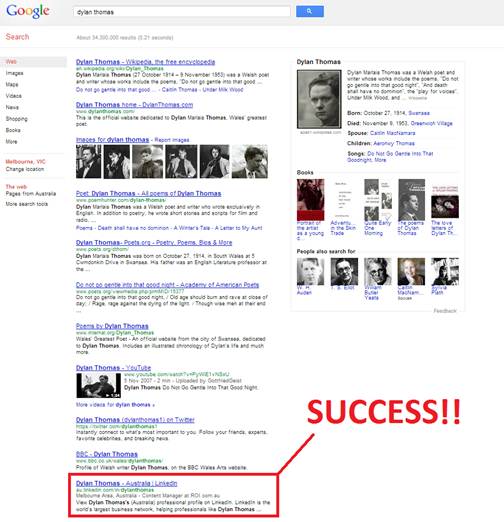 My parents named me after the famous Welsh poet, Dylan Thomas.
My parents named me after the famous Welsh poet, Dylan Thomas.
It was an interesting choice when you consider that the man, despite being the creator of famous sonnets such as “Do Not Go Gentle into that Good Night” and “Under Milk Wood,” was widely considered a drunk and a womanizer.
It was a lot to live up to, but I have so far managed to simply ignore it all and live my own life. In fact, it was only when school teachers, local librarians, or anyone over the age of 60 heard my name that I was reminded of my famous namesake.
Until now.
Since becoming involved in the SEO industry, I, like many others, became shamelessly infatuated with Google search results for my name. This all came to a head this year when I attended my very first Pubcon in Las Vegas.
After sitting in on reputation management presentations that featured guys like Andy Beal and Kenny Hyder, I decided to take the famous Welshman on.
Blind with confidence, I made getting a first page ranking for the term ‘Dylan Thomas’ my goal.
First, I Identified the Properties at My Disposal
I am based in Australia, so decided to focus my efforts on google.com.au rankings. Got to crawl before you can walk.
As it stood, my LinkedIn profile was the strongest personal property I had at my disposal. It was ranked at the top of the fourth page of search results, making it the closest profile I had to the top 10.
Other options, such as my Twitter or Google+ profile, weren’t in the ballpark, so I chose to ignore them and focus on LinkedIn.
I Employed One SimpleTechnique for Optimisation
One handy little trick I picked up during my time at Pubcon was around ‘About Us’ and profile page optimisation. I think this was one of Andy Beal’s gems of knowledge.
Often when these pages are written, people fall into the trap of writing in the first person. English teachers will tell you this is fine. Google will tell you it’s not.
‘About Us’ pages or personal profiles should be written in the third person.
This way, you will be able to get more mentions of your brand/name, thus improving how the page is optimized for that term. My LinkedIn page didn’t have a summary, so I created one and wrote it from the third-person perspective.
Ignore How Arrogant You Sound Writing in the Third Person
Writing using my name instead of ‘I’ was a hurdle. It went against all my writing instincts.
The trick to making it not sound so self-indulgent is to proofread out loud. This way you can balance up whether you have overdone the use of your name and can substitute it with something else.
If you feel like you are overdoing it, utilize the ratio of one mention of your name for every two sentences written.
The Key Statistics After Writing My New Summary
Here are the keyword stats I ended up with after writing a new LinkedIn summary:
- 233-word summary
- My full name ‘Dylan Thomas’, was mentioned three times
- My first name ‘Dylan’, was mentioned 10 times
- For the entire profile the keyword density for my ‘Dylan Thomas’ was 6.54 percent, with 31 mentions recorded. This was interesting as it exceeds the common rule of having a keyword density of 5.5 percent or less.
The result? Sitting Pretty on the First Page
It wasn’t until two weeks after I made the changes that I checked back to see if it had worked.
Lo and behold, I’d snuck onto the first page. Great success.

What factors helped me break Dylan Thomas’ stranglehold?
After some analysis, there were a few things that ensured my LinkedIn profile hit the first page:
- As discussed, better optimization of ‘Dylan Thomas’ on my LinkedIn profile, with focus on the summary, was the key factor.
- The fact that URL extension of my LinkedIn profile was ‘/in/dylanthomas’ would have helped. My Twitter handle is @dethomas7, which isn’t ideal for optimisation. My Google+ URL is just full of ridiculous numbers—extremely ironic when you consider SEF URLs are one of Google’s key ranking factors.
- Links built into my LinkedIn profile weren’t too bad. I have written a few articles on other SEO related websites that linked to my profile and were shared on some other sites around the Web.
- LinkedIn naturally puts ‘Australia’ in my profile’s title tag, assisting me to rank on google.com.au.
Have you found similar results? Have you got other tricks that worked?
When I started this, I thought there was little to no chance I would get ranking. The amount of content out there on Dylan Thomas the poet was really high, and I was a fair way off the first page.
This shows that a little bit of quality can overcome quantity. My content, URL, links, and title tag all worked together to get me to the first page—a real team effort!
As many of you can vouch, the battle doesn’t stop there. My attention now turns to better rankings and the Holy Grail—first page of google.com for the search term ‘Dylan Thomas’. I’m currently ranked halfway down the seventh page. I’ve got my work cut out for me.
Have you had any success with reputation management/brand optimization strategies? Anything to add or suggest how this could be improved? Keen to hear it below!



